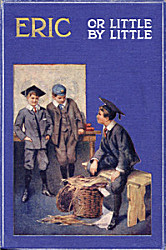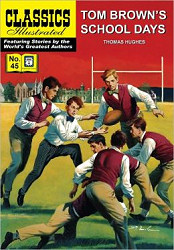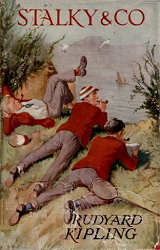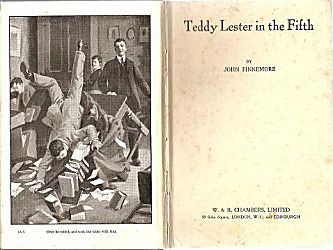The Library of Spanking Fiction: Wellred Weekly
|
||||||
|
Articles
Items of interest regarding all things spanking
|
||||||
|
|
Corporal Punishment in Schoolboy Fiction "Oh, young boys, if your eyes ever read these pages, pause and beware. The knowledge of evil is ruin, and the continuance in it is moral death. That little matter — that beginning of evil — it will be like the snowflake detached by the breath of air from the mountain-top, which, as it rushes down, gains size and strength and impetus, till it has swollen to the mighty and irresistible avalanche that overwhelms garden and field and village in a chaos of undistinguishable death. That extract, on the perils of masturbation, is from one of the most famous Victorian school stories, the Reverend F.W. Farrar's Eric or Little by Little. Farrar was one of the many reverend gentlemen who turned their hands to writing boys' school stories. Experts in the field of the Victorian school story will tell you that Eric is a far more influential tale than Tom Brown's Schooldays. I can never work out why Thomas Hughes' famous work is so popular, although it has provided us with one of the great heroes of English fiction in the school bully, Flashman, immortalised by George MacDonald Frazer in his excellent Flashman books. Tom Brown may be a fictional character but Hughes actually went to Rugby and studied under the great Dr Arnold. There is little in the way of corporal punishment in the book and what does occur happens off-stage so to speak. Happily for us aficionados there was rather more in the 1971 BBC series starring Iain Cuthbertson if I remember rightly. In fact the episode where the head boy, Brooke, canes a weeping Flashman whilst berating him for cowardice was strong fare for a Sunday lunchtime audience.   Farrar's tale of Eric has not always met with universal approval and the novelist Eric Ambler said it was "the only book I ever wanted to lose". I think that is being a little hard on it as it deals with some complex ideas such as the corruption of innocence. The 'Little by Little' of the title. Later issues of the book were censored as there was rather too much romantic feelings between the boys for some tastes. To Farrar nothing is trivial, he never says boys will be boys but sees their words and deeds as being of everlasting importance. Naturally the punishments must be significant too. "Now, sir," said he to Brigson, "I shall flog you." One way in which a Victorian school story will usually differ from those written in later years is a certain coyness about which part of the anatomy the instrument of correction is applied to. Often it is applied to the hand or as in the case of Kipling's Stalky and Co, the shoulders. However, if the reader is informed that it was given across the lower back he can be fairly sure it was applied across the buttocks. In Ernest Fairfield, Two terms at St Andrews it is applied across the shoulders with brutal force. This was another book written by a reverend gentleman, namely the Rev. Arthur Noel Malan. It is a moral tale for children with more than its fair share of whippings. Most of the Reverend Malan's tales were fairly light hearted if rather cruel in nature and serialised in the pages of the Boy's Own. This, his first novel published in 1888, was somewhat darker. Its theme is chose your friends wisely, something young Ernest fails to do. "He instantly stood round, and received across his shoulders twenty cuts with the ground-ash as hard as the mighty Armstrong could let them in. Ernest bore the chastisement without a sound." I had better admit that I still read a lot of schoolboy fiction, at my age too. Of course my mental age might be slightly lower than my actual age. I still read the Greyfriars tales just as I did as a child. In fact if I were allowed one book on my desert island it would certainly be Harry Wharton's Rebellion. It makes me laugh even though I have read it a dozen times at least.   One could almost imagine being a pupil at Greyfriars. It has a sort of idyllic quality which even its fiercest critic, George Orwell, noted. Aside from the insipid Jennings stories the first non Bunter school story I read was one of John Finnemore's Teddy Lester stories. Frank Richards never described a caning with as much attention to detail as Finnemore did. They were reasonably well written too although not nearly as enticing as the Greyfriars tales. There was no Harry Wharton, my schoolboy hero, to admire, however the characters are well drawn and he captures something of the brutality of a boys only boarding school. From Teddy Lester in the Fifth this short extract typical of the well described canings which occur with great regularity: "The senior prefect ran his eye over the crowd and his glance fell on his fag, Bridges. Breathless stuff and not in the least bit atypical of John Finnemore's Teddy Lester tales. For many years the author was a headmaster so undoubtedly that helped him achieve a certain authenticity. Desmond Coke, author of The Bending of a Twig was another schoolmaster who regularly included several well described and usually quite brutal canings in each book he wrote. In the preface to one of his novels he refers to criticisms of his fondness for corporal punishment and says, "an occasional sound thrashing is a healthy moral tonic for boys." continued... |
|||||
| Pages: 1 2 3 4 5 6 7 8 9 10 11 12 13 14 15 16 | ||||||


